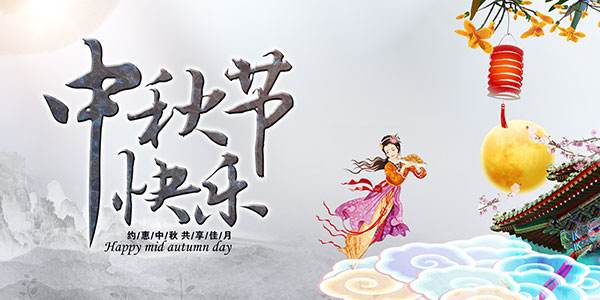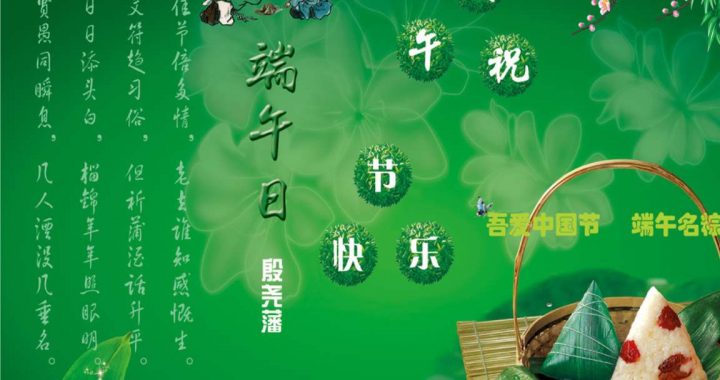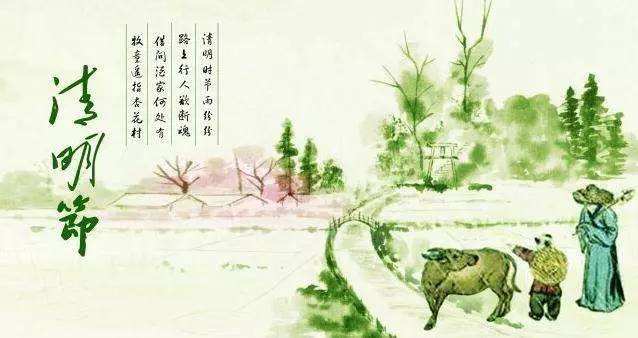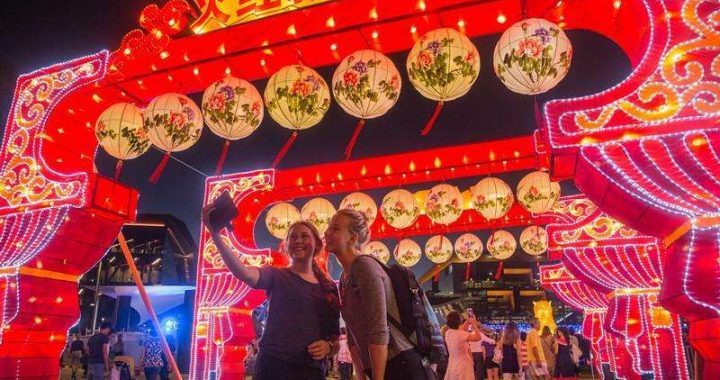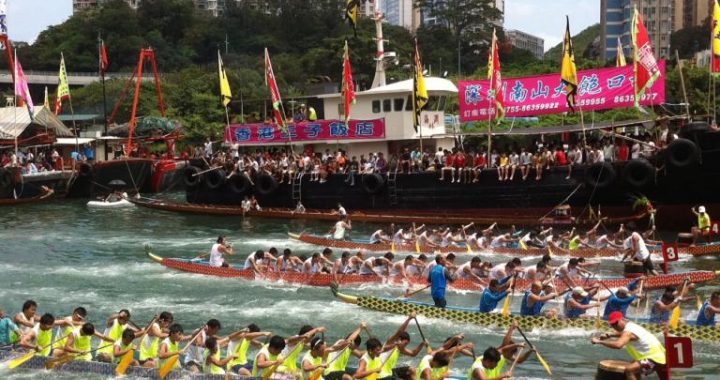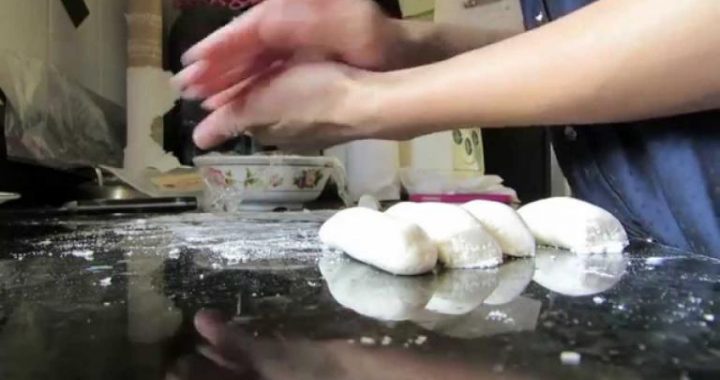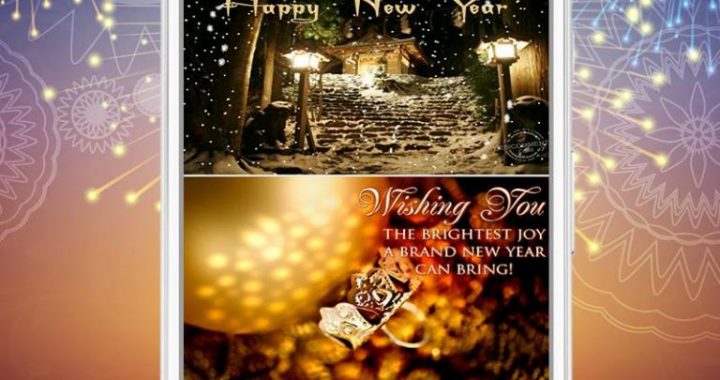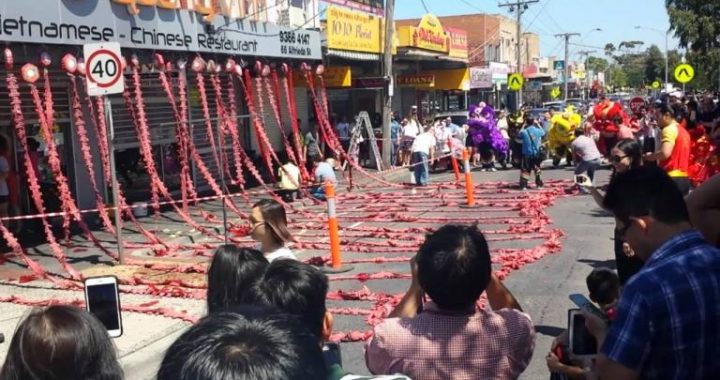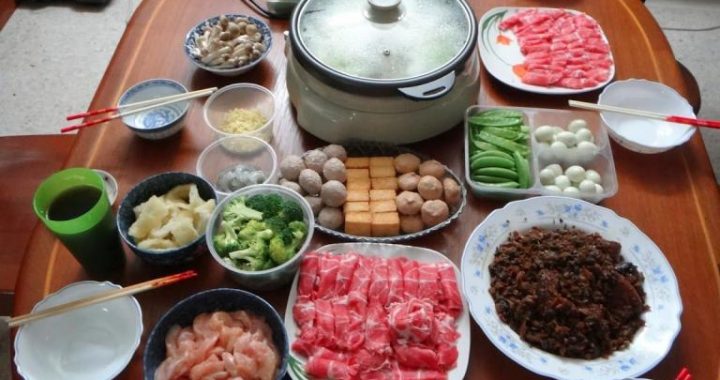Festivals from Other Minority Groups: Torch Festival, Water-splashing Festival, Third-day-of-third-month Singing Festival
8 min readThe southwestern part of China, with Yunnan-Guizhou Altiplano as its center, is an area with numerous minority groups. More than 30 ethnic groups can be found on this relatively small land. Yunnan province alone provides habitat for more than 20 minority groups including Yi, Bai, Zhuang, Dai, Miao, Hui, Tibetan, Lisu, Hani, Laku, Wa, Naxi, Yao, Jingpo, Buyi, Pumi, Nu, Achang, Dulong, Jinuo, Mongolian, etc. These minorities have rich and colorful traditional festivals. For example, the Yi ethnics has the Torch Festival; Dai minority has the Water-splashing Festival; Zhuang people has Third-day-of-third-month Singing Festival and Miao nationality has the Blossom Mountain Festival.
1) Torch Festival
The Torch Festival is known as “Oriental Dionysia”.
It is a traditional festival for Yi, Bai, Hani, Naxi, Laku andJinuo minority groups. Different groups set the festival at different time. Generally it starts from the twenty-forth day of the sixth month in lunar calendar and lasts for three day-and-nights.
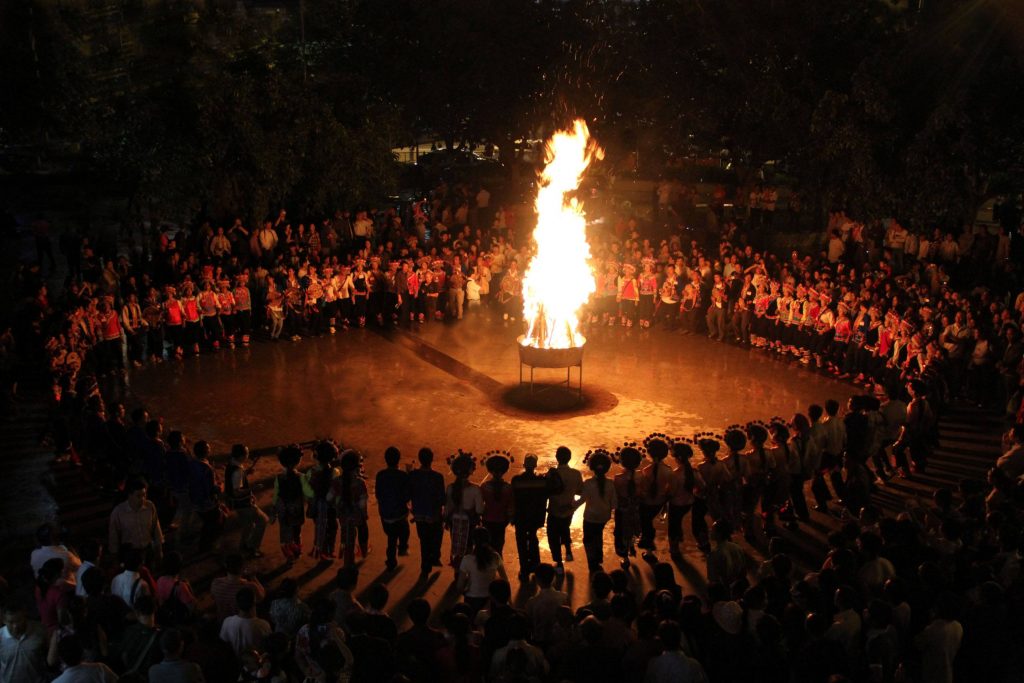
The original Torch Festival, according to some scholars, was based on a calendar used by Bai and Yi people in ancient times. The calendar included 10 months,36 days a month, and two Star Returning Festivals in winter and summer respectively. The two Star Returning Festivals were both considered the New Year, and the one in summerwas called the Torch Festival as people often lighted a torch on that day. There are also some other legends aboutthe origin of the Torch Festival, yet all of them have the.
Torch Festival
purpose of offering sacrifice to deities and dispelling ghosts, which reveals people’s good wish for harvest.
In the Torch Festival, every family needs to light a torch and hold the torch to illuminate the corners in the room and walk around the field. Some villages even have torch parade so as to drive away pests & evil and pray for good harvest. The custom of holding torch to shed light on mulberry tree and field was also found among Han people in Southern Song dynasty. In Ming and Qing dynasties, people in Zhejiang and Jiangsu provinces had the custom as well. The most attractive activity in the Torch Festival is the Bonfire Party. People play musical instruments like lusheng(reed pipe wind instrument), yueqin (four-stringed moon-shaped Chinese mandolin) and sanxian (three stringed plucked instrument), singing and dancing for a whole night. During the festival, people also do wrestling, horse race and beauty contest with ethnic characteristics.
Yi people’s Torch Festival is the most famous and has many special customs. For example, in killing animals for sacrifice, people will observe the gallbladder: if it is full of bile, it foretells a year with good harvest; if it is lack of bile the coming year may be lack of harvest. In killing a swine, people will observe its pancreas. In killing a hen, people will pay attention to the curving direction of its tongue so as to foretell good or ill luck. In the Torch Festival, no matter in what weather, all girls will hold a yellow linoleum umbrella, not to block the sun or rain, but to make their face appear slight yellow in the light through the umbrella. Yi people regard yellow as the most beautiful color. Girls with yellow face are considered as beauties.
2) Water-splashing Festival Water-splashing Festival is the New Year Day in Dai Minority’s calendar. The time is set between the sixth andseventh months, about 10 days after the Qingming Festival.
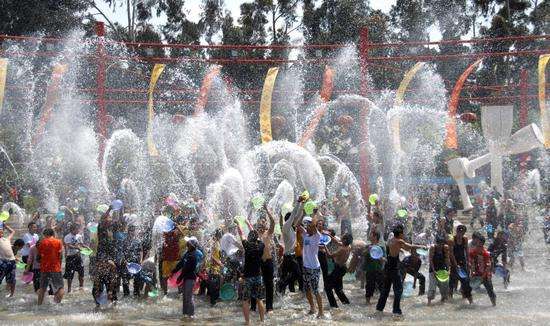
It lasts for about 3 to 4 days. The first day of the festival is the New Year’s Eve and the last day is like Yuandan Festival.
The Water-splashing Festival manifests Dai people’s adoration to water. They believe that water is the symbol of life and it is a sacred bridge between human and deity(orghost). In their opinion, water is an auspicious thing that can keep away trouble & illness and bring bless & happiness.
The main activity in the Water-splashing Festival is to splash water. Besides, people also do other activities like dragon boat race, Gan Bai activity(go to the country fair or local market), casting bags, setting off Gaosheng (bamboo rocket with gunpowder), and releasing Kongming Lanterns (sky lanterns), bathing Buddha, peacock dance and white elephant dance.
On the first day of the festival people have the dragonboat race. On the second day, people dress up to join the grand Gan Bai activity (Festival in Dai language is called”Bai). Unmarried young men and women play casting bags,a traditional Dai game helping young people in making acquaintance with each other. Many people set up their friendship and finally get married through this game.
To set off Gaosheng and to release Kongming Lanterns are reserved activities in the Water-splashing Festival.
Gaosheng is a small local rocket made of gunpowder and Water-splashing Festival bamboos. When people are launching Gaosheng, they tie it to the launching rack and ignite the fuse, then the bamboo rocket will fly to the sky. As a bamboo flute is tied to the rocket, it produces sound when flying in the sky. In sending Kongming Lantern, people ignite the candle and put it into the “great balloon”, and the Kongming Lantern will fly to the sky with the flotage produced by the heated air. In the morning of Yuandan Festival, people will carry offerings to temples and hold the Bathing Buddha ceremony. After the ceremony, the jamboree-water-splashing starts immediately. People will have to prepare clean water for the activity in the spot. They put fragrant petals and shell leaves in the water. As shell leaves are used by Buddhists to write the copy of sutra, people believe it may help to shun ghosts and avoid evil. Therefore the sacred, clean and fragrant water people splash in the festival symbolizes bless and happiness. Anyone who participates in the water-splashing activity should be willing to be watered by others. The more they get watered the happier they should be.
There are two kinds of water splash, civilized splash and bold splash. Civilized splash is for the senior. To scoop up some water and pour it into his clothes while sayingsome word of beatitude, or just use a branch to dip somewater and then splash to him. Bold splash is for compeer and friends, usually in a recreational and playing way.
Large basin or barrel of water will be poured over people’s face and the whole body. People will chase after each other and splash water to one another happily.
3) Third-day-of-third-month Singing Festival The Zhuang minority is an ethnic group with the largest population. Zhuang people make friends through singing, express their passion through singing and even find their love through singing. Almost all Zhuang people cansing very well. The Zhuang villages have regular singing festival every year, known as”Ge Wei”(singing dyke). The time for the singing dyke varies in different places. In most places people have “Ge Wei”on the third day of the thirdmonth in the lunar year. Third-day-of-third-month Singing Festival is a traditional singing festival for Zhuang people.
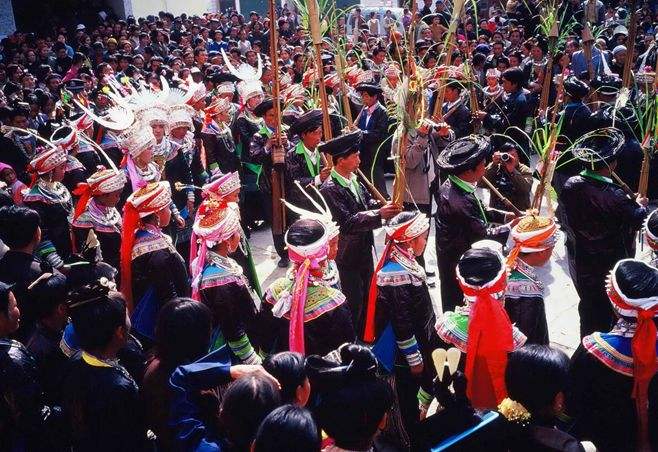
“Ge Wei”had been popular in Song dynasty. As recorded in Geographical Records of Taiping Period written by an author from Song dynasty,”In harvest time, Zhuang people would choose a day to offer sacrifice to deities and people would gather to have a singing party.”After Song and Yuan dynasties, the development of Zhuang people’s mountain singing became even more prominent.
The singing dyke had become a place for cultural
entertainment and amorism between young men and women. In Qing dynasty, it became a grand festival in which thousands of people took part.
Third-day-of-third-month Singing Festival is held on avacant ground and usually lasts for two or three days.
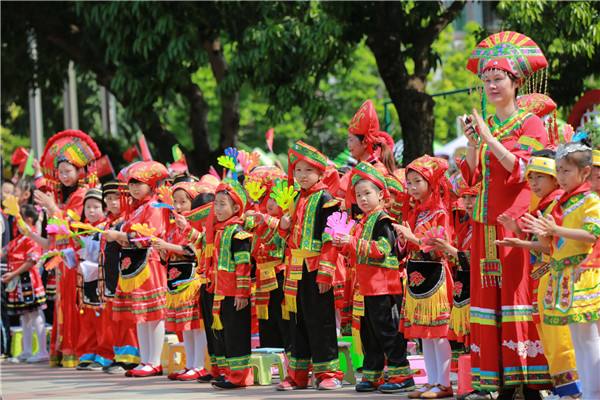
Young men and women from within dozens of miles will dress themselves up to join the festival. Participants may amount to several hundreds or even thousands. In”Ge Wei”activity, young people from different villages formgroups of three or five and have a singing competition against each other. Customarily young man will start with a Singing Festival on the Third day of the Third Month in Lunar Calendar.
song called”Touring Song”, observing and looking for a singer he favors. When he finds someone he will sing “Meeting Song”and”Inviting Song”. If the girl responds he will sing the”Inquiring Song”. When they get to know each other better they will sing “Adoration Song” and “Fellowship Song”. Before they depart they will sing “Departing Song”. The lyrics are usually composed and sang on the spot, yet the words are always touching and full of good imagination. If the young man and the girl favor each other through singing, they will send each other their love keepsake. Besides young people, the middle aged and senior people as well as children also join the festival. They are the audiences of the singing competition.
In”Ge Wei”, there are also abundant and colorful games other than singing competition, including casting embroidery ball, clashing colorful egg, setting off beautiful fireworks and performing the Zhuang drama which is favored by all people. Near the singing dyke, numerous peddlers gather to form a market, in which all sorts of commodities can be found. During the singing festival, Zhuang people will make the five-color sticky rice and dye colorful eggs to celebrate.4) Blossom Mountain Festival Miao ethnic people have many traditional festivals that are celebrated in different ways. Among all thosefestivals, the Blossom Mountain Festival is one of the grandest and most popular.
Blossom Mountain Festival is also named”Stepping on Blossom Mountains”or “Leaping Blossom Festival””.
The time for the festival varies. Some are set in the first month, some in the fifth month, the sixth month or the eighth month. The location for celebration is a place called the flower ground, which is usually set upon a sloping field among several Miao villages. On the flower ground there is a flower pole, the symbol for the Blossom Mountain Festival.

The flower pole is a big fir trunk with its skin peeled off and decorated with colorful banner, pig head and good wine. The pole is always the center of the flower ground.
As a start for the celebration of Blossom Mountain Festival,a sainted senior or the host of the festival will hold a memorial ceremony for the flower post. They will kill chicken, burn paper and set off firecrackers in order to pray for a smooth running of the festival. After the solemn ceremony there are lots of folk festivities, such as singing competition, lusheng dancing, bull fighting, cock fighting, bird fighting, flower pole climbing, lion leaping and other performances. Among these activities, the lusheng dancing runs through the whole festival celebration. Girls in colorful dress dance with boys’ reed pipe-wind music. Boys stand in line, dancing while blowing and girls dance around the boys.
Sometimes boys play the reed-pipe wind instruments first and girls dance afterwards. Sometimes several hundred people in the flower ground dance together with the music.

The Blossom Mountain Festival is also an opportunity for young men and girls to know each other. The girl favored by a boy will be dragged into his flower umbrella.
The ethnic festival on the flower ground attracts guests from all over the world. Only in several days, the guests will get to know the Miao ethnic culture with thousand years of history.
